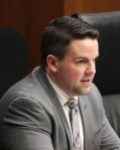By Mathew Keller, RN JD, MNA Nurse Practice & Policy Specialist
“Samuel’s Law,” under consideration in the South Carolina Senate, would require the South Carolina Board of Nursing to revoke a nurse’s license “upon the board’s finding that a licensed nurse misreads the physician’s order and overmedicates or undermedicates a patient.”
While the circumstances surrounding the introduction of Samuel’s Law, involving the fatal overmedication of a 7-year old, are tragic, the bill is an inappropriate response and does nothing to correct the systems-level failures that are often the basis of medication errors.
As a systemic review of 54 studies on medication errors puts it, since “nurses find themselves as the ‘last link in the drug therapy chain’ where an error can reach the patient, they have traditionally been blamed for errors. However, the reality is that the conditions within which the person responsible for the error works, as well as the strategic decisions of the organization with whom they are employed, are often the key determinants of error.”[1]
Therefore, any law that purports to reduce the incidence of medication errors ought to focus on systems-level failures that can lead to medication errors, including inadequate communication pathways (e.g. illegible prescriptions, poor documentation, lack of transcription), problems with pharmaceutical supply and storage, unmanageable workload, availability and acuity of patients, staff fatigue and stress, and interruptions or distractions during drug administration.
Correcting or addressing the above issues, rather than punishing unintentional errors with the loss of one’s livelihood, will go a long way toward addressing the root cause of medication errors Samuel’s Law seeks to address. It also fits with the model of “just culture,” widely accepted and adhered to in both the medical and aviation industries, which seeks to create an environment that encourages reporting mistakes so that precursors to errors can be understood and systems issues can be fixed.
As Lucian Leape, MD, member of the Quality of Health Care in America Committee at the Institute of Medicine and adjunct professor of the Harvard School of Public Health, said in testimony before Congress, “Approaches that focus on punishing individuals instead of changing systems provide strong incentives for people to report only those errors they cannot hide. Thus, a punitive approach shuts off the information that is needed to identify faulty systems and create safer ones. In a punitive system, no one learns from their mistakes.” (Leape, 2000).
Samuel’s Law, while well-intentioned, uses the wrong approach to prevent medication errors. How would you change the language to better prevent errors? Share your thoughts in our comment section below.
[1] Keers, R. N., Williams, S. D., Cooke, J., & Ashcroft, D. M. (2013). Causes of Medication Administration Errors in Hospitals: a Systematic Review of Quantitative and Qualitative Evidence. Drug Safety, 36(11), 1045–1067.

